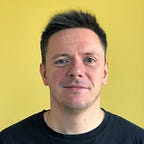How Ukraine Became a Democracy. Part 1
--
Before the full-scale Russian invasion, I saw quite a few comparisons of Ukraine with Afghanistan in the context of a quick fall of the West-supported government after USA withdrawal. I know very little about Afghanistan, but I am sure Ukraine is very different.
People from the West might not be aware that Ukraine is, in fact, a democracy by any sane definition. Moreover, this democracy was not imposed on us by the USA and not supported by the NATO military. We struggled and won it ourselves, albeit not without moderate help from the West’s “soft power” organizations. That is why it should not surprise anyone that Ukrainians are willing to fight for it.
In order to understand the present, it helps to look into the past. For a bigger perspective on Ukraine’s origins and history, I recommend an actual historian — Tymothy Snyder, and his entry-level write-up on the topic. What I want to tell is the story of modern Ukraine as seen through my own eyes.
I was born and raised in Kharkiv, the second-most populous city in Ukraine, some 40 kilometers from the Russian border. Kharkiv is a Russian-speaking city, and unsurprisingly, my mother tongue is Russian. I was born a year before Chernobyl, in 1985, when Gorbachov announced a new policy of “Perestroika” — an attempt to save failing Soviet state with limited, liberal reforms. That didn’t work out. When I was five USSR collapsed.
Since I was too little, I do not remember much about USSR times. My memories start at the 90s — a challenging period of economic ruin, massive unemployment, and rapid social transformation amid exposure to the market economy. My family coped better than many and managed to become a part of the new Ukrainian middle class with some hard work and adaptability.
My parents voted “Yes” on the 1991 Ukrainian independence referendum. They supported Leonid Kravchuk for the President, however. Kravchuk was an old communist. He was seen as a moderate candidate, associated with less radical changes and Russian-friendly foreign policy. His adversary, national-democratic candidate Viacheslav Chornovil was too alien to most Ukrainians outside western regions.
Last year when my family, including my father, went to Kyiv for a Euro qualifiers football match, we visited a special exhibition in the National historical museum dedicated to the 30th anniversary of Independence. There was a final protocol of the first presidential elections among the exhibits, declaring Kravchuk a winner. “I should have voted for Chornovil”, — my father said.
He was born in Komsomolsk-upon-Amur, a city in Russian Far East, to a mixed Russian-Ukrainian family. My grandfather was an avionics engineer from Luhansk region in Ukraine. He spoke Ukrainian and had a vyshyvanka. My grandmother was from Vyatka region, deep Russia. In the 70s, they all moved to Kharkiv.
My mother’s family were all Slobozhanschyna locals. Mixed culture. Some were Russified, others clung to their Ukrainian roots. My godmother (she was blood-related) taught me a kolyadka about “palyanytsya”, the word jokingly and not so jokingly used to detect Russian spies and saboteurs.
Коляд коляд колядниця
Смачно з медом паляниця
А без меда не така
Дайте, тітко, п’ятака(Kolyad kolyad kolyadnytsya
Palyanytsa tastes good with honey
Not so good without honey
Give me auntie some money)
My parents evolved from post-Soviet nostalgic disenfranchised poor to pro-democratic Ukrainian middle-class patriots. It took time, though.
The first reckoning happened in 2004. After a decade of mild autocratic rule of the second President Leonid Kuchma, Ukraine was slowly climbing out of poverty. The economy started to breathe. There were, however, powers inside and outside the country trying to turn Ukraine to the familiar path of our closest neighbors, Belarus and Russia, where Lukashenko and Putin were consolidating their increasingly totalitarian regimes, slowly stripping citizens of their rights. Kuchma reluctantly supported the candidacy of Victor Yanukovich as his successor. Massive voting fraud schemes were set in motion to ensure his victory.
With a stark contrast to both Belarus and Russia, Ukraine always had strong political opposition. They consolidated around the candidacy of Victor Yuschenko.
In the autumn of 2004, I was a 2nd-year university student. My parents offered me a job in Yanukovich’s election campaign. Just money, nothing personal. I was supposed to go around apartments in my zone of responsibility and agitate people to vote for my candidate, following a bunch of guidelines.
Being nineteen years old, I did not really understand the politics at stake. But I had a chance to compare two options. Yanukovich’s people gathered us, the campaign workers, in the government cultural center. The head of the city district administration spoke. He told us that since he isn’t legally allowed to support any candidate, he… took a vacation — a blatant disrespect to the law. He spoke about bad nationalists from western Ukraine who don’t produce anything and live off the working people of the east. These were the arguments straight from the 1991 playbook.
But it was 2004, and the country was quickly changing. We, the younger people, looked at the prosperous, blissful West in awe. For us, it was like Valinor, the Undying Lands from Tolkien’s legendarium (which I was very fond of at the time). Our parents told us we should run there as soon as we could. But why run if we could bring that here?
That autumn, I went to Yushenko’s rally. He came to Kharkiv personally and gave a long speech from the stage. He talked, he joked. He was energizing and so alive — a complete opposite of an awkward bully Yanukovich. He was convinced and convincing that a better Ukraine was possible. I was completely bought. I voted for him and stopped doing anything for Yanukovich’s campaign.
Orange revolution was the first large milestone on the road to a better Ukraine I participated in. It was bloodless, and we won. But the struggle was only starting.
To be continued…
